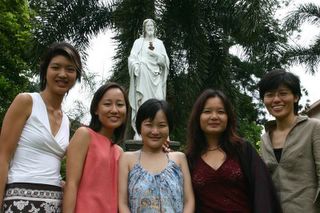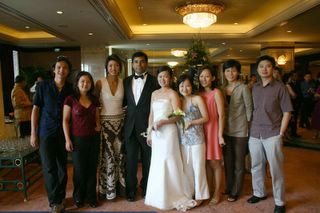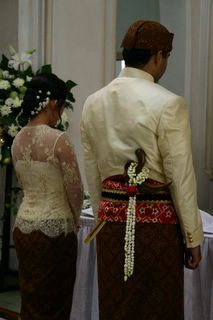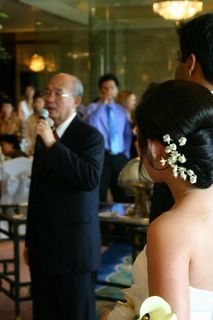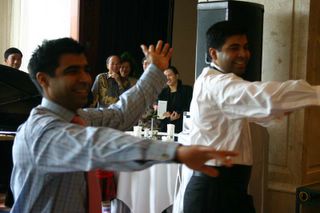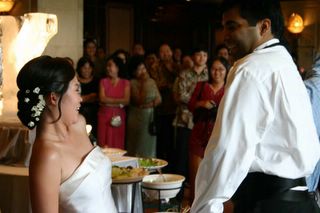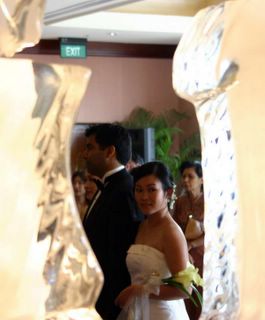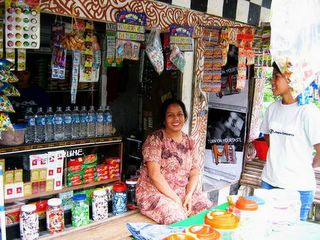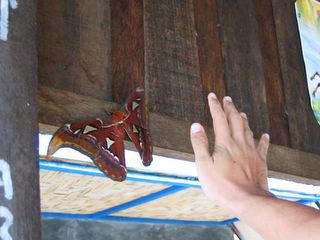* Pictures courtesy of Johann AnnuarI have always been fascinated by street markets. The variety of goods available for sale, how hawkers display their wares and the way shoppers pick and choose what they want – there are few ways that one can better assimilate and soak in the feel of a place and its people.
Whether it’s a street cart’s roti-bakar, or a handmade hoe-blade from the knife-stall, these are goods that I can’t find where I come from, or where I’m living in today. Ironically, the simpler and less sophisticated the lifestyle, the more unique the market goods are. Perhaps this is a function of returning-to-basics… in place of mobile phones, there are twenty styles of hoes and axes painstakingly sharpened by hand. In place of fast-food, there are handmade pancakes and freshly fried bananas. In place of pills and over-the-counter drugs, there are home-dried/pickled medicinal water eels.
Bukit Tinggi’s and Padang’s marketplaces were probably the most typical of commerce in this area of Sumatra. I slowly ambled along the stalls, engrossed with what was being offered. Local women, with brightly colored headscarfs, chatter about their day – with gigantic bunches of plastic bags roped around their fingers, swinging around like they weighed no more than a few ounces each.

Tending the stalls were mostly generations of females – mothers and daughters, grandmothers and granddaughters.

The cynic may interpret the presence of children as a ploy to generate “awwww… how cute” and therefore attract the buyer to potentially spend some money. Well, the cynic is half-right since I did spend money buying things.
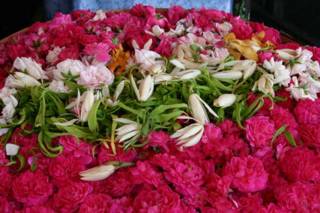
Passing a stall that sold freshly-cut flowers, I sidled up to the stall that sold seventy-five different ways of deep-frying dough into crispy flavored snacks.
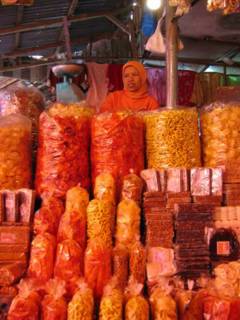
The lady presiding over her little tower of carbo-loading munchies was all ready to sell me her wares by the gallon-bag – that is, until I pointed out I really only liked the taste of her peanut candy. I walked past the storefront that sold dried legumes and rice, and tried to ignore the weevils that dotted the surface of each sack.
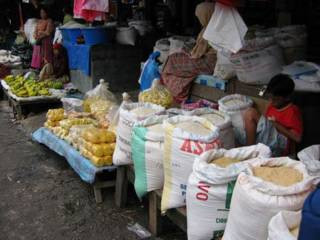
Even this extra garnish of protein pales in comparison to the next thing I saw being sold as a dried condiment with medicinal benefits… skewered and air-dried water eels.
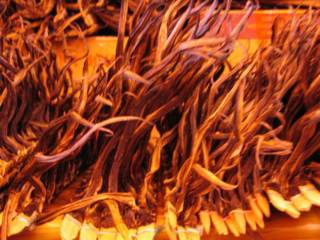
These little suckers were caught by the netful, and slit from neck to tail-end. Their insides are cleaned out, and a skewer is poked through the cut side, coming out from the mouth on the other side. Ten or so of them can fit on one skewer, all these skewers are hung upside-down to air-dry, such that when it comes time to sell the water eels, their stiff dried carcasses make for easy packing. A grotesque contrast to their fluid movements when they were still alive. They are sold by the skewer, and should you prefer, the skewer can be recycled for future eel-use.
And of course, my martial arts bent got all excited when I saw a knife stall. The wonderful array of axes and hoes in so many different sizes was quite mind-bending. How many ways, really, can you chop a tree, or hoe the field?
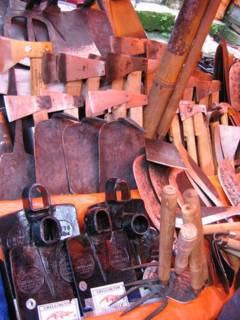
Any self-respecting market would also provide a wide array of foodstuffs to feed its shoppers when energy flags. I certainly needed no justification to stuff my face. In Bukittinggi, there were freshly baked corn/tapioca muffins wrapped in banana leaves (which I have coined “indomuffin”), starchy thick pancakes stuffed with peanuts (“martabak”, nothing like the one we know in Singapore), grilled sandwiches of chicken and fried egg (“roti bakar”), boiled peanuts (kecang), and fried batter bananas (“goreng pisang”), and barbequed marinated beef/chicken like I’ve never had before (“satay”, complete with the most heavenly peanut sauces).
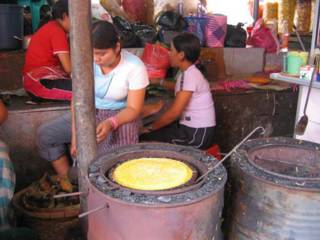
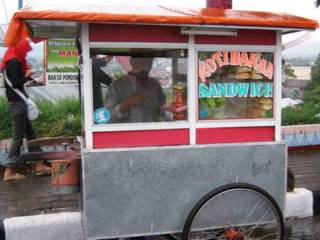
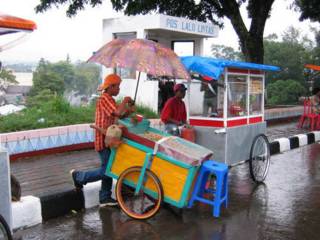

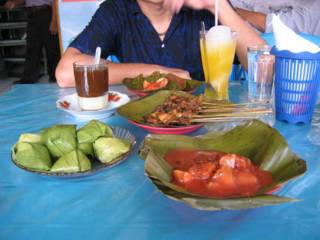
Not to mention the uncountable plates of gado-gado, mee goreng, lontong, nasi-padang… to be topped off in Jakarta with a satisfying bowl of mee bakso ayam, with chocolate-cheese toast as a dessert chaser (yes, the flavors actually work).


Not just sundries, the markets also provided everything ranging from the cheap-o haircut
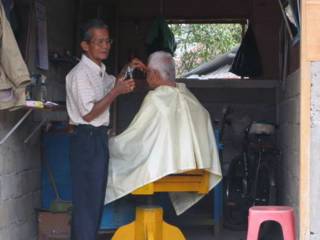
or the stylish makeover,

intricate kebaya tailoring
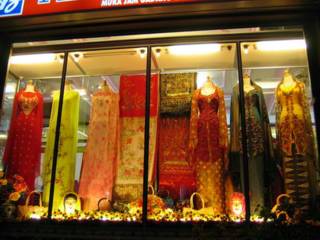
or bulk-sold basic whites.
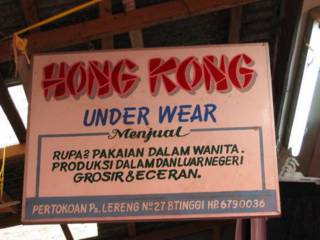
The marketplace in Indonesia puts people from all walks of life into the same place, where bargaining and commerce makes equals of everyone.
At the end of the day, the shoppers could ride one of the horse-drawn carts lined up waiting for fares,
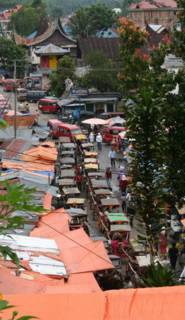
or if more affluent, head home on their own steam.
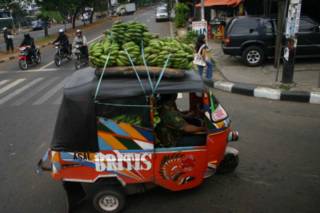
Although on the surface a far cry from the suburban shopping malls and cavernous parking lots with gas-guzzling station wagons at the ready to bring home gigantic sacks of 12-pack 2-ply toilet paper, it’s comforting how across all walks of life, the process of shopping, paying and getting home, finds common elements anywhere in the world.
Go to
Indonesia 2: Motorbike Happy ...
